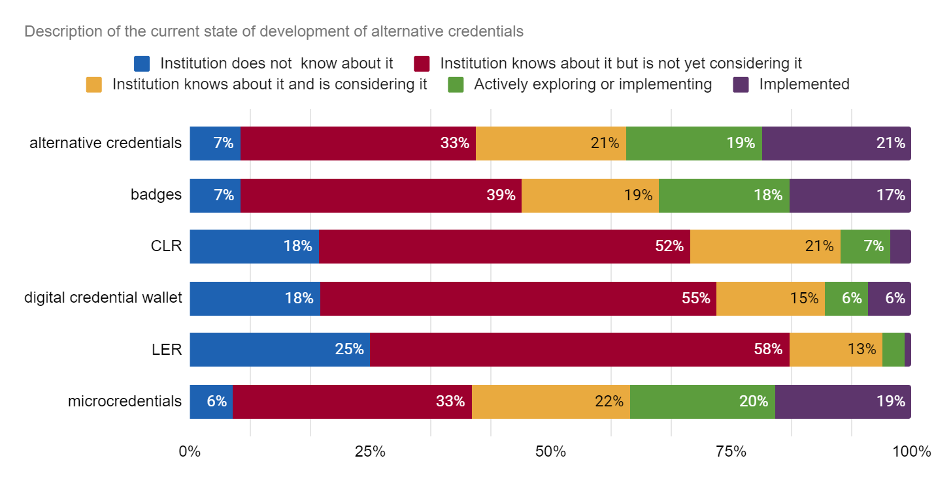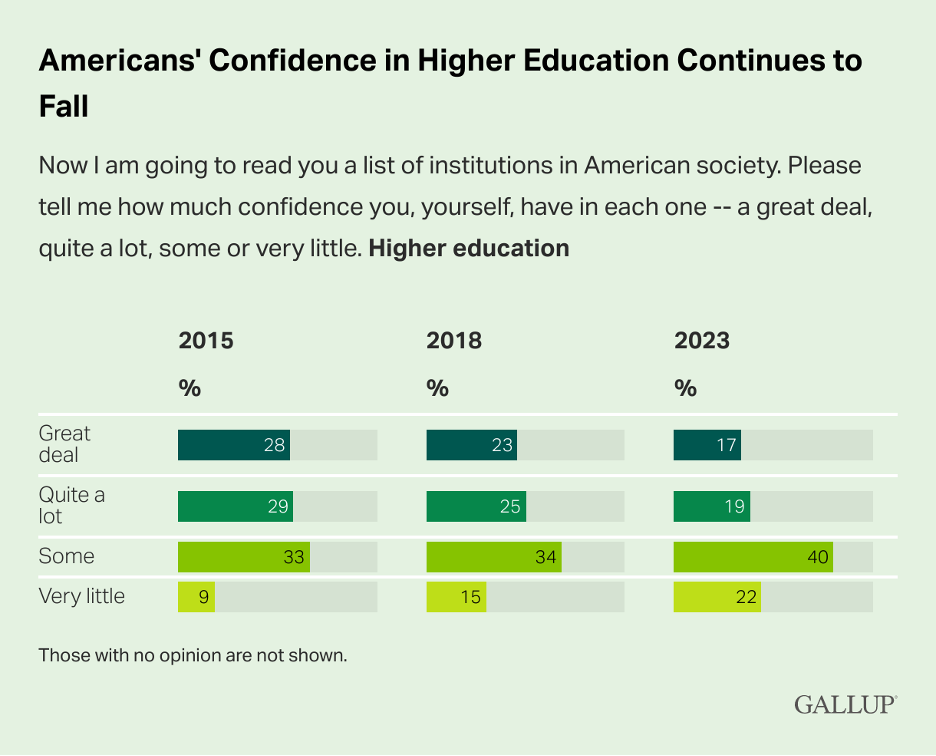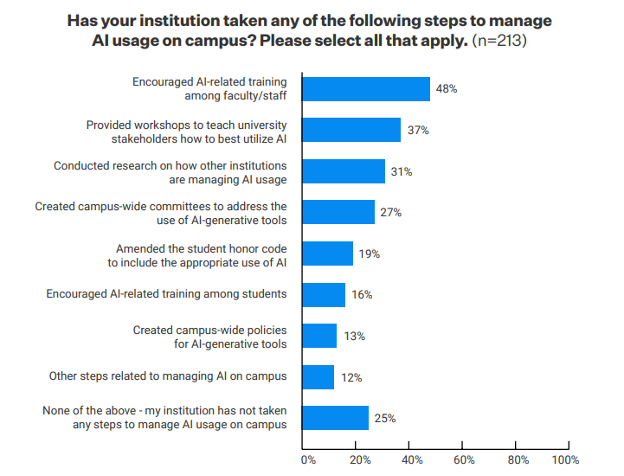July, 2023 Eye on Research
Commentary
Ever wished you could see a list of AACRAO research reports by subject area, in reverse chronological order? Well, wishes do come true! Thanks to our excellent communications team, this webpage provides you the information you seek.
AACRAO Research Update
Collaboration, Competition or Convergence?
A comprehensive report was released this month highlighting the relationship between professional and continuing education and traditional academic programs. This report was made possible in collaboration with UPCEA and Modern Campus.
State of Digital Credentials in the AACRAO Community
A brief survey on the state of digital credentials in the AACRAO community in the United States and Canada closed recently. Responses were received from 318 institutions. A sneak peak of some data is shown below. The report will be released in late August or early September.

Current Higher-Education Research and Related Topics
Student Perceptions of Online Law-School Courses
During the pandemic, law schools and students widely embraced online Juris Doctorate (J.D.) programs. AccessLex Institute and Gallup conducted a survey of law students to gather insights into their experiences. The survey revealed part-time students, caregivers and those attending Tier-4 law schools were most receptive to online courses. Additionally, underrepresented students of color expressed
the belief that online courses offered more time for legal-work experience and the opportunity to earn money. But Tier-4 students face challenges in accessing career services. The report's recommendations underscore the need for continued improvement
and support in the development of online legal education to meet the diverse needs of students. Recommendations include the following.
-
"Continue to design distance-learning opportunities with students in mind." This suggests the focus should remain on meeting the needs and preferences of students while developing online programs.
-
"Promote and push online supports that add value, such as accessible job-search assistance." This highlights the importance of emphasizing and making available valuable online resources, such as job-search assistance to aid students in their career
pursuits.
-
"Identify and remove barriers to full and stimulating participation in online J.D. courses." This recommendation emphasizes the necessity of identifying and addressing obstacles that may prevent students from fully engaging and benefiting from
online J.D. courses.
Gen Z Sees Value in Higher Education, with Some Caveats
A report from ECMC Group shows the results of surveying over 7,000 students about their thoughts on higher education and their future
careers. The research took place between January, 2020 and January, 2023. Key points include:
Considerations from potential students:
-
25% considered community college
-
19% considered career and technical education
-
22% considered on-the-job training
-
52% considered 4-year institutions (down from 71% prepandemic)
College priorities for Gen Z:
Student beliefs and support:
Financial concerns:
New Gallup Poll Shows Confidence in Higher Education Continues to Fall
Americans' confidence in higher education has dropped to 36%, a significant drop from previous readings in 2015 and 2018. See Figure 1. The latest decline in public trust in higher education is attributed to a June, 2022 Gallup poll. The poll also found confidence waned in 16 other institutions in recent years. Key points include the following.
-
Higher education ranks fourth in confidence among the 17 institutions measured, with small business, the military and the police in the top three low-confidence spots.
-
Major demographic subgroups of those surveyed, led by Republicans, are less confident in higher education.
-
Confidence among adults without a college degree and those aged 55 and older, regardless of political orientation, dropped nearly as much as Republicans since 2018.
-
At 59%, Democrats are the only key demographic subgroup with majority-level confidence in higher education.
-
The rising costs of postsecondary education may play a significant role in the recent drop in confidence.
Figure 1: Americans' confidence in higher education

Source: Gallup, Inc. “Americans’ Confidence in Higher Education Down Sharply.”
Gallup.com, July 11, 2023.
Emerging Technology and Artificial Intelligence Are Focuses of New Study
A study by Inside Higher Ed and Hanover Research examines how stakeholders view the impact of AI on higher-education institutions. The survey-sample size is limited.
The authors indicate, “Conclusions drawn from a small sample size (n<20) should be interpreted with caution.”
Figure 2: How Institutions Are Managing AI Use

Source:https://www.insidehighered.com/. “Emerging Technology and AI,” July, 2023.
Infographic Examines Data Practices and Priorities in Higher Education
An infographic from Touchnet Higher Ed looks at how institutions of higher education are refining the use of data. Areas in which institutions are capturing more data include student experiences, business efficiencies and
financial data. Some recommendations for better data practices include:
- see analytics as a strategy
- banish silos
- manage expectations